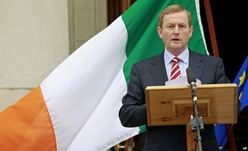Irish support EU austerity plan, to push for slashing cost of its bank bailout
Over 60 per cent Irish voters have supported the proposal to ratify the European Union fiscal treaty, putting pressure on the government to push European leaders to slash the cost of its crippling bank bailout.

For long Ireland has been pressing the EU partners, particularly Germany, to permit write-downs of Irish banking debts that could ultimately cost Irish taxpayers 68 billion euros ($85 billion) and have already given Ireland the worst deficits in Europe.
In a victory speech Prime Minister Enda Kenny said the voters' verdict in the referendum would strengthen his hand as he seeks, with many other European nations, to shift Germany's opposition to boosting growth through government spending.
"I have consistently argued that budget rules alone will not be enough to overcome the economic crisis that faces Europe. They must go hand in hand with a real and concrete growth programme for Europe," Kenny said in a televised press conference on the steps of his central Dublin office.
Kenny said EU and European Central Bank chiefs must agree on a European-wide new system for managing the toxic banking debts that brought Ireland to the edge of bankruptcy in 2010 and now threatens Spain.
Kenny said he had raised the issue of the multibillion rescue in several phone calls with EU chiefs, including Germany's Angela Merkel, once the referendum result was confirmed.
The Irish prime minister said the bailout for bust banks - more than 46 billion euro (37 billion pounds) - must now be included in wider efforts to kick start the European economy.
"Ireland's banking debt must form part of that solution," he said.
One of his junior ministers, Brian Hayes, insisted the focus was on the 34 billion euro plus (27 billion pounds) burden left behind by rogue lender Anglo-Irish Bank.
.
Five of Ireland's 43 constituencies rejected the treaty plan for tighter budgetary control from Brussels including both electoral regions of Donegal and three others in Dublin.
The first opportunity for the treaty success and the potential for a growth pact is to be discussed later this month at an informal European summit.
Kenny spoke by telephone with German Chancellor Angela Merkel, who later in a statement welcomed Ireland's willingness to vote yes to more cuts as an outcome that "deserves particular recognition and respect.
Source: Europe News.Net
- 456 reads
Human Rights
Fostering a More Humane World: The 28th Eurasian Economic Summi

Conscience, Hope, and Action: Keys to Global Peace and Sustainability

Ringing FOWPAL’s Peace Bell for the World:Nobel Peace Prize Laureates’ Visions and Actions

Protecting the World’s Cultural Diversity for a Sustainable Future

Puppet Show I International Friendship Day 2020

